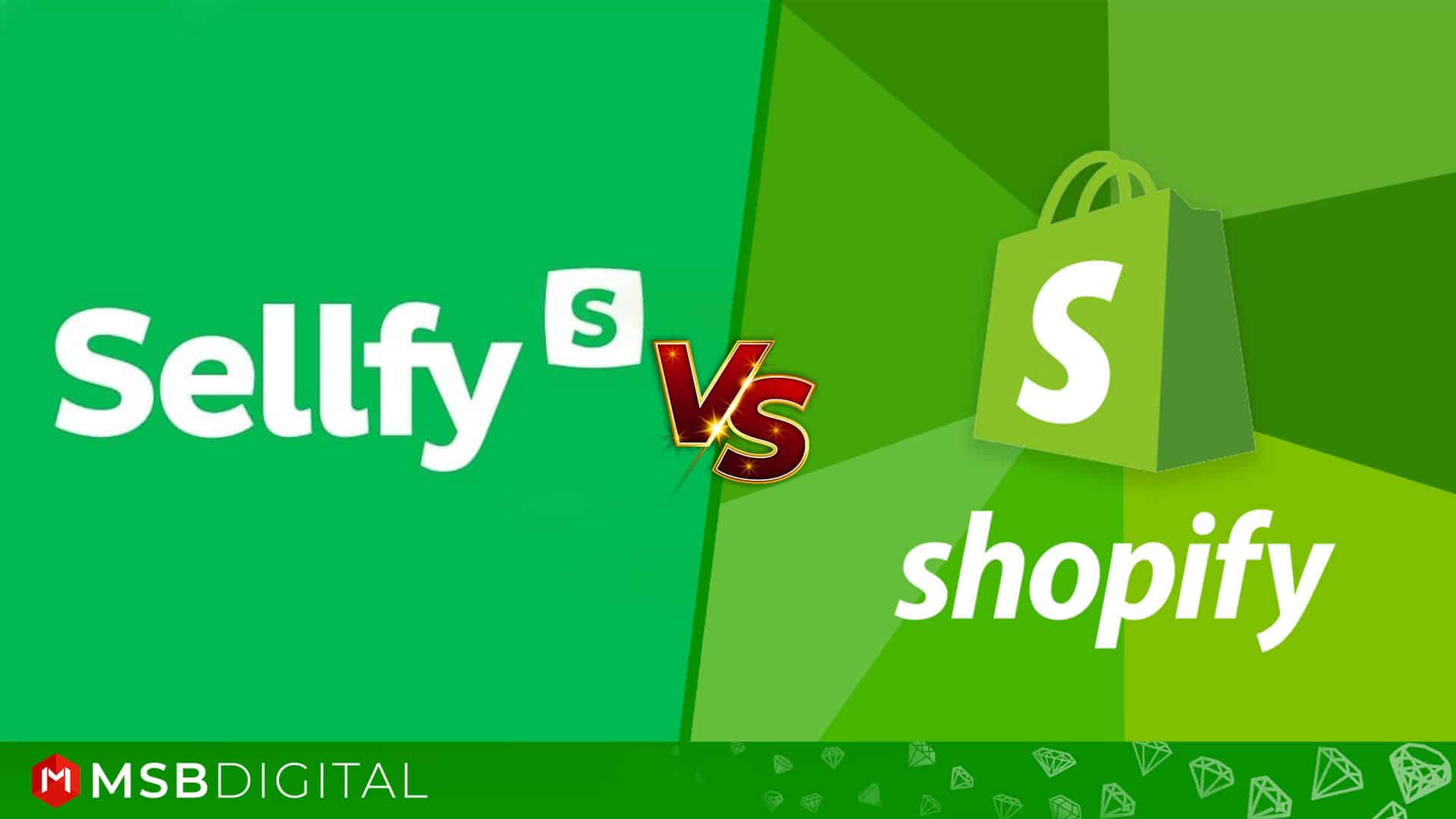Choosing the appropriate platform for digital product sales online can have a big impact on your company's performance. Selecting the best platform to sell your digital goods is essential in the fast-paced world of e-commerce, where the virtual market is growing at an unparalleled rate. Two names that come up frequently in conversations are Shopify and Sellfy. These are well-known platforms with their own features, advantages, and disadvantages that provide ways to sell digital items.
To assist you in making an informed choice, we will compare Sellfy and Shopify, two well-known e-commerce systems, in this post.
Perception Sellfy and Shopify
Sellfy: It is a simple online store that was founded in 2011 and is mostly intended for makers of digital products. It provides tools for marketing, safe payment processing, digital file distribution, and shops that are configurable. Sellfy aims to make digital product sales online easier and more accessible for creators of all stripes.
Shopify: One of the most widely used e-commerce systems worldwide, Shopify was founded in 2006 and serves companies of all kinds. It offers an extensive toolkit for creating, overseeing, and expanding online businesses. Shopify is well known for its adaptability when it comes to selling physical things, but it also facilitates the sale of digital goods with a variety of features and integrations.
Simplified for Digital Downloads: Sellfy
Simplicity is ideal for Sellfy. With just a few minutes, you can build up your store using its user-friendly interface and concentrate on adding digital products and writing descriptions. In addition to having a simple checkout procedure that is mobile-friendly, Sellfy smoothly interacts with well-known payment gateways. Integrated email marketing technologies facilitate audience engagement and advertising of products.
With its focus on digital products, Sellfy overcomes the hassles associated with shipping and inventory control. Additionally, it provides print-on-demand services, which let you market your ideas on tangible goods. However, Sellfy's capability might feel limited to companies that intend to grow beyond digital products.
An Expandable E-Commerce Monster: Shopify
Shopify is a powerful e-commerce platform available to companies of all kinds. Shopify has a lot more features and functionality than Sellfy, however, it has a little higher learning curve. Shopify provides you complete control over your online store, from controlling inventory and shipping regulations to making discount codes and personalizing your storefront.
Shopify's greatest asset is found in its app store. Countless external applications effortlessly merge with your system, offering extra features like CRM, email marketing, and accounting solutions. Although certain apps are paid for, you can customize your store to meet your demands according to this vast marketplace.
Comparing Features
Usability: Sellfy takes pride in its easy-to-use interface, which includes tools for managing products and sales as well as a simple setup approach. Despite being more feature-rich, Shopify may have a more difficult learning curve for novice users.
Personalization: With a large selection of themes and plugins, Shopify delivers a plethora of customization possibilities that enable customers to construct incredibly customized stores. Sellfy, on the other hand, prioritizes usability and simplicity over customizing possibilities.
Payment Processing: PayPal and Stripe are only two of the many payment channels that are supported by both platforms. On the other hand, Sellfy expedites the checkout procedure, which might boost digital product conversion rates.
Digital Items Management: Featuring tools like file hosting, product updates, and automatic delivery, Sellfy was created specifically for digital products. Shopify needs third-party apps to provide comparable features, which could be more expensive.
Promotional Tools: While Shopify provides a wider selection of marketing tools through its massive app store, Sellfy has built-in marketing features including affiliate marketing, discount coupons, and email marketing.
Value & Price: Locating the Sweet Spot
Sellfy Pricing Plans:
- Starter Plan:
- Monthly Cost: $19
- Yearly Billing: $456 (billed every two years)
- Features:
- Up to $10,000 in sales per year
- Unlimited products (both digital and physical)
- Subscription products
- Connect your own domain
- Email marketing capabilities
- Business Plan (Best Value):
- Monthly Cost: $49
- Yearly Billing: $1,176 (billed every two years)
- Includes Everything in Starter, Plus:
- Up to $50,000 in sales per year
- Product upselling
- Cart abandonment features
- Affiliate marketing
- Removal of “Sellfy” branding
- Store design migration
- Premium Plan:
- Monthly Cost: $99
- Yearly Billing: $2,376 (billed every two years)
- Includes Everything in Business, Plus:
- Up to $200,000 in sales per year
- Product migration support
- Priority customer support
Shopify Pricing Plans:
- Basic Plan:
- Monthly Cost: $19
- Features:
- Ideal for solo entrepreneurs
- Up to $10,000 in annual sales
- Unlimited products
- 77% shipping discount
- 10 inventory locations
- 24/7 chat support
- Localized global selling in 3 markets
- POS Lite included
- Shopify Plan (Best Value):
- Monthly Cost: $49
- Includes Everything in Starter, Plus:
- Up to $50,000 in annual sales
- Product upselling
- Cart abandonment features
- Affiliate marketing
- Removal of “Shopify” branding
- 5 additional staff accounts
- Advanced Plan:
- Monthly Cost: $299
- Yearly Billing: $3,588 (25% savings)
- Includes Everything in Shopify, Plus:
- Up to $200,000 in annual sales
- Custom reports and analytics
- Enhanced 24/7 chat support
- Localized global selling in 3 markets (additional markets available for $59/mo each)
- 15 additional staff accounts
- 10x checkout capacity
- POS Lite included
- Plus Plan (For Complex Businesses):
- Starting at: $2,300/month (3-year term)
- Features:
- Competitive rates for high-volume merchants
- 200 inventory locations
- Priority 24/7 phone support
- Localized global selling in 50 markets
- Fully customizable checkout with 40x capacity
- 200 POS Pro locations with Shopify Payments
- Sell wholesale/B2B
Sellfy: The Good and The Bad
Pros
- Ease of use: Sellfy is well-known for having an intuitive user interface. It takes little effort to set up your store and add products, so you can quickly get it up and running.
- Digital Product Sales: It's great at managing the sales of digital products, which makes it ideal for authors, artists, and creators.
- Customization: In order to give customers a consistent brand experience, creators may modify their shops to mirror their branding, including colors, fonts, and logos.
- Built-in Print-on-Demand: In case you enjoy creating custom merchandise, Sellfy has integrated print-on-demand features.
- Marketing tools: Sellfy is a basic tool for product promotion, but it comes with some built-in marketing tools that include email marketing, coupons, and discount codes.
- Design & Themes: A combination of Sellfy's eye-catching design options, you can build an aesthetically pleasing online store.
- Payment Options: Sellfy accepts several payment methods, including PayPal and major credit cards, making it easy for buyers to buy products.
- Customer Support: Users appreciate Sellfy's outstanding customer service, which ensures a seamless experience.
Cons
- Limited Types:: Sellfy is not as feature-rich as some of its competitors, especially when it comes to sophisticated analytics and marketing capabilities.
- Limited scalability: If your company experiences tremendous growth, Sellfy may not be able to keep up with your needs. It can be more appropriate for startups or smaller companies.
Shopify: The Good and The Bad
Pros
- All-in-One Solution: Shopify offers an all-inclusive bundle that includes marketing tools, apps, themes, hosting, and more.
- Ease of Use: Shopify has an easy-to-use interface and is suitable for beginners. You don't need coding skills to set up and run your store.
- Scalability: Shopify can expand with your company and manage a large amount of traffic.
- Versatile Product Types: Sell physical goods, digital products, subscriptions, and packaged items on the same platform.
- Beautiful Themes: Shopify presents a large range of responsive, well-designed themes that are easily customisable. Users can design a visually appealing storefront that complements their business by selecting from a selection of premium and free themes.
- Built-in Security: Shopify sets a high priority on security, protecting your company and client information.
- App store: A wide range of apps are available in the Shopify App Store that boost your store's capabilities. Apps are available for practically any use, including customer support, shipping, marketing, and bookkeeping.
- Mobile-friendly: Shopify themes are all mobile-responsive, so your store looks fantastic and runs flawlessly on any device.
- Growing Popularity: Shopify, a widely used platform, keeps growing and improving.
Cons
- Limited Free Themes: Although there are free themes available, premium themes can be costly.
- App fees: Your budget may be impacted by the extra charges associated with certain third-party apps.
- Difficult exit strategy: Migrating your store from Shopify to another platform can be complicated and time-consuming.
My Suggestions: Which One Should You Choose?
Sellfy
- Ideal for Digital-Only Sellers: Sellfy does well if selling digital goods is your main priority. It is a great option because of its simple setup and safe delivery mechanism.
- Print-on-Demand Integration: Sellfy's seamless integration with print-on-demand platforms lets you sell customized products without requiring any add-ons.
- Mobile App Management: You can quickly manage your store utilizing the mobile app.
Shopify
- Versatility for Mixed Product Types: Shopify enables extensive e-commerce tools if you intend to sell both digital and physical goods.
- App Ecosystem: Shopify offers scalability and flexibility through its vast app environment.
- Community Support: Gain the benefit of a sizable fan base and useful resources.
In the conflict between Sellfy and Shopify, there isn't a universal solution. Think about the product types, growth strategies, and needs of your business. Sellfy might be the better option if you prioritize simplicity and sales that are exclusively digital. Shopify is still the adaptable choice if you're looking for scalability and a wider selection of offerings. Lastly, I just want to give you my rating if you are a beginner or an expert it doesn't matter.




